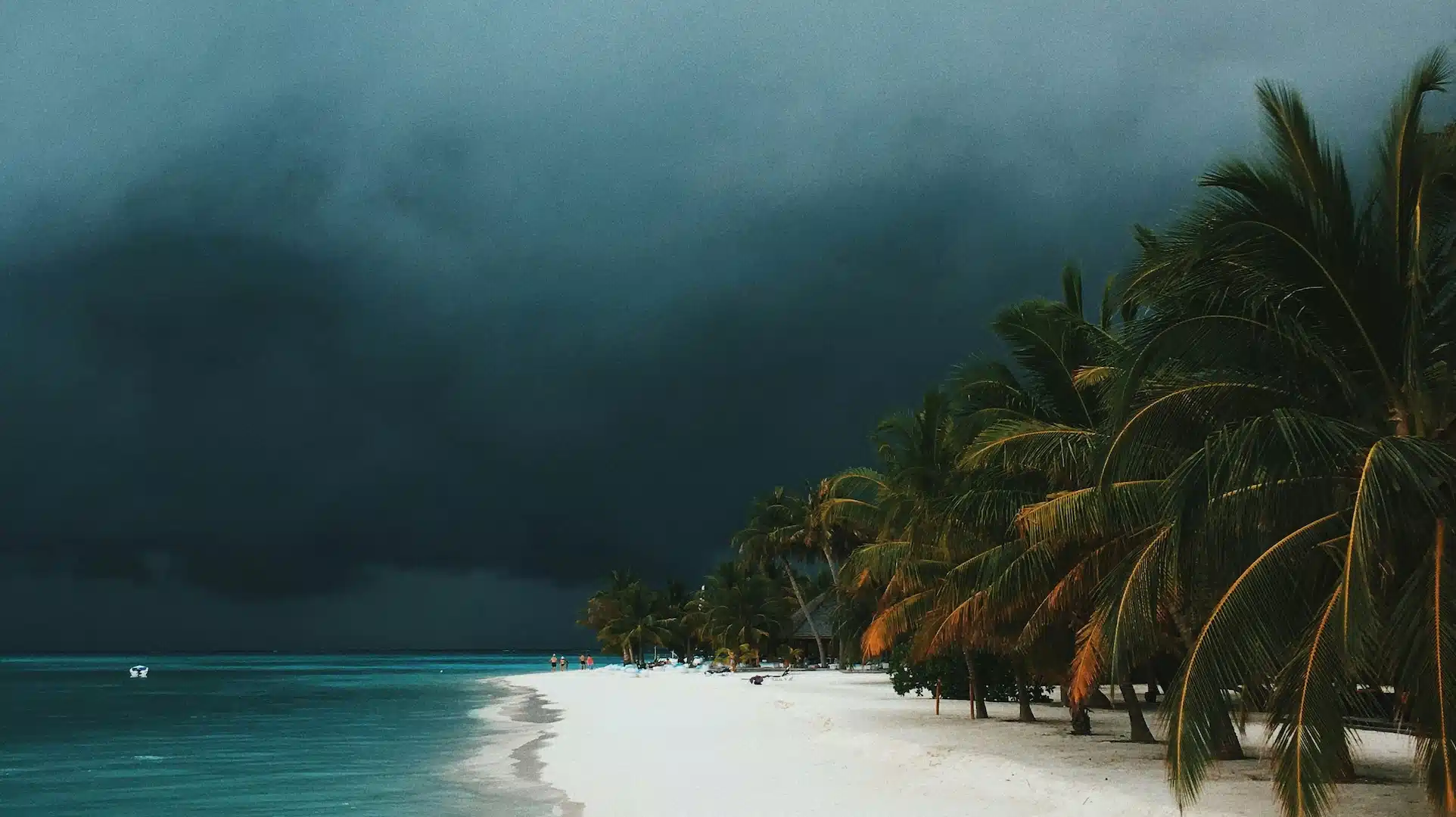
Home > Travel Safety & Health > Does Travel Insurance Cover Hurricanes?
Share this post
If your vacation is in a country or region that experiences hurricanes, you may be wondering whether or not your travel insurance will cover them and to what extent.
In this guide, we're going to take a look at whether or not travel insurance protects you from these storms.
We will also tell you where to find this information if you have already purchased a policy and you're trying to figure out if it will provide coverage for hurricanes.

Hurricanes are, unfortunately, a common occurrence in some popular travel destinations. Areas like the Caribbean, Mexico, and the Southeast United States are particularly prone to them.
Other parts of the world get "hurricanes" too, but they're called typhoons or cyclones depending on where they happen.
The word for the storm is geographical, meaning hurricanes, cyclones, and typhoons are all the same thing. They're just called something different depending on where they happen.
Hurricanes: Mexico, the US, the Caribbean, South America, Western Europe/Africa.
Typhoons: Eastern Asia, the Eastern South Pacific, Eastern Australia.
Cyclones: Eastern Africa, the Middle East, the Western South Pacific.
Does travel insurance cover hurricanes?
Typically, no. Travel insurance doesn't usually cover hurricanes.
The effects of natural disasters (and their consequences) are almost always excluded from travel insurance.

How do I find out if my policy covers them?
Any time you want to find information about what your travel insurance policy covers, what it doesn't, and any exclusions it has, you should always refer to the terms and conditions.
While terms and conditions can be quite lengthy, they contain everything you need to know about your travel insurance. This makes them the first place to go to when you have a question about a specific guarantee, or anything else.
Sometimes, it can feel overwhelming to find information in the terms and conditions due to the formal writing of the text and how much information there is. In order to help policyholders get a summary of the policy, there is something called an IPID available.
IPID stands for Insurance Product Information Document and it is a summary of an insurance policy. IPIDs are intentionally written in a way that is easier to consume and understand, avoiding confusing industry jargon and legalese.
This is a great resource, but keep in mind that the IPID is a summary. To learn all of the specific details, you will need to open up the terms and conditions. In fact, you may have to if the IPID doesn't give you the answer you're looking for.
If you have trouble finding the information you need, you can always reach out to the customer support team of your insurance provider. They will be able to tell you what is covered, what isn't, and any exclusions that exist (like hurricanes, for example).
Does travel insurance cover any natural disasters?
It isn't just hurricanes that are usually excluded - it's all natural disasters. This includes anything from hurricanes and tornadoes to volcanic eruptions and earthquakes.

Can you file a claim for a hurricane?
You can only file a claim for an event that your travel insurance covers (per its terms and conditions). If/when you do file a travel insurance claim, it's very important that you follow the claim process exactly.
You should be able to see the claim process on the website you purchased your insurance policy through and/or in the terms and conditions.
Why is it important to follow the claim process closely?
If you don't follow the directions laid out in the T&Cs (terms and conditions), your claim could be denied.
Timing matters. Some policies may require you to start a claim at a specific moment when an event occurs. For example, if a traveler breaks a bone, the claim process may need to start before the traveler seeks treatment.
They may also require you to provide specific documents (such as receipts) or to get assistance/care through certain channels in their network.
This is one reason it's best to understand the claim process before you purchase your policy, and at the very least before you leave for your trip.
What to do if there's a natural disaster while you're traveling
If there's a natural disaster during your travels, the most important thing is that you stay safe.
To do this, you should pay attention to the weather and local news where you are staying, especially if there are any warnings or alerts.
If there are warnings or alerts, you should always heed the advice of local authorities. If an evacuation is recommended by authorities, for example, you should follow their directions closely.
Another best practice is to try to keep your phone charged. If you have a portable battery charger, make sure that is fully charged too.
Many travel insurance policies offer 24/7 travel support and assistance. If this is the case with your policy, you can call the hotline to get advice over the phone from dedicated travel experts (this is subject to the terms and conditions of your insurer).
FAQs about travel insurance and hurricanes
Related posts
Upcoming travels ? Get Insured !
Find the right insurance for your trip by using our powerful comparison tool!
Sarah Pardi - February 26, 2026
Sarah Pardi - February 19, 2026
Sarah Pardi - February 13, 2026
Sarah Pardi - February 12, 2026





